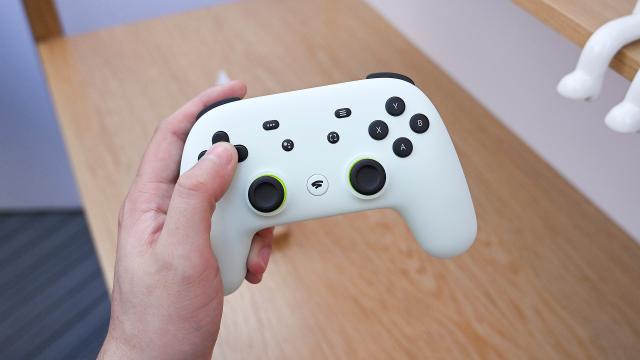We finally have the major details on Stadia, Google’s big push into gaming and at a glance it looks great: Crossplay with Xbox and Windows 10, a wide variety of recent and upcoming games, and the ability to play those games on any device with a solid internet connection. I’m writing this on an 200 Mbps internet connection so Stadia’s requirement for just 35 Mbps for the highest quality stream seems wonderful.
But it might be a rough start for Stadia.
Just to be clear I haven’t tested Stadia out apart from a very controlled demo at GDC back in March, so there is the possibility Stadia could and will be everything Google has promised. A truly new era in gaming that finally untethers us from consoles and powerful PCs.
But the internet requirements for Stadia are a major red flag. Back at GDC Google Stadia chief Phil Harrison told our sister site Kotaku that you’d need just 25 Mbps download speeds be able to play games in the highest available quality (4K, 60fps, HDR, and 5.1 surround sound).
This week Andrey Doronichev, Director of Product Management on Stadia, told me that the requirement for the highest quality had increased.
“We have an updated guidance here,” he said. “You actually need 10 Mbps to stream at least 720p, but actually, it could be higher depending on specific details of the kind of network situation or your game. And then to comfortably stream 4K—the best experience—we recommend 35Mbps.”
That means you need 10 Mbps more than originally anticipated for that top tier experience. That’s not good! Google didn’t improve performance since the announcement. It just got more realistic about what delivering high quality would require.
The trouble is that internet speeds in the U.S. is garbage. As I’ve noted a number of times only 1 in 5 households have 25Mbps. It’s estimated that 162.8 million Americans don’t even have access to internet better than 25Mbps.
Did you watch the Stadia stream today? Did it hiccup for you like it hiccuped for me? That’s likely what you’ll get with your video games too, only instead of just seeing a blurry stream you’ll lose an hour of gameplay because you couldn’t see the bad guy and died because your stream was all blurry.
That, at least, is the experience I’ve had with the streaming services already available from Nvidia and French company Shadow. In ideal settings, they’re pretty good. But when I try to play when my roommate is home and watching Netflix, the experience rapidly deteriorates, and so far the only thing we’ve heard from Google on how it’s different is that it has a big infrastructure in place and algorithms that will make its game streaming platform better than competitors.
Maybe there’s something to those claims. Google having datacentres all over the U.S. will absolutely make the experience better, and as we’ve seen from Google Search (and sometimes YouTube) the company can perform wizardry with a well-designed algorithims. It could, theoretically, pull this off.
But I just don’t think it can completely get around the bandwidth requirements. There are a lot of Americans who just don’t have good internet access. Particularly those in rural areas where ISPs may only provide crummy 3 Mbps DSL for the majority of residents, or they may offer faster speeds, but the connection is much more inconsistent.
So you might get 25Mbps down at 1 p.m. when everyone in a 8km radius is at work or school, but things slow to a crawl from 6 p.m. to midnight when all those folks saunter home and hit the Netflix button on their Rokus.
When I asked Doronichev how Stadia was supposed to work for that wide group of Americans who just don’t have the good stuff his response was wonderfully optimiostic, but also struck me as deeply naive.
The good news is that ISP have a long history of adjusting to the growing demands from users. And you know this has been happening over the history of the internet. As we move from text to web from web to video and now we’re moving to real-time gameplay we’re relying on incredible technical infrastructure by Google that’s been delivering billions of search queries and videos on YouTubeand have been evolving over many years. So you know I’m pretty sure we’re going to get there.
I like that Doronichev is sure we’ll get there. Too bad Google has been pulling out of the ISP game and the current FCC seems content to let ISPs run roughshod over consumers. Stadia could very well be magic, but as long as it’s streaming over a broken internet, it’s fucked.
